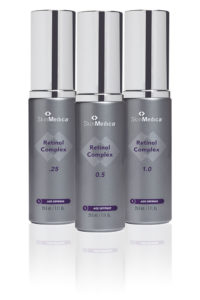What is a Retinoid?
Topical retinoids are derived from vitamin A or are chemically related to it. In dermatology topical retinoids are used in the treatment of many diverse diseases and are effective in the treatment of a number of dermatological conditions such as inflammatory skin disorders, skin cancers, disorders of increased cell turnover (e.g. psoriasis), photoaging and skin wrinkling. The most common skin conditions treated by retinoids in our Del Mar dermatology practice include acne, sun damage and actinic (pre cancerous) skin changes.
Some of the retinoids that are commonly prescribed may include:
- Retinol Complex (SkinMedica)

- Retin-A or Retin-A micro gel
- Adapalene (Differin)
- Tretinoin
- Tazorac
How to use your Retinoid
“How much Retinol should I use ?” This is a question I wish more patients would ask. It seems that many patients subscribe to the philosophy that “More is better” This is not true with retinol, or other retinoids. If you are seeing peeling, redness or inflammation with your retinoid, you are using too much. You may also be using to strong of a dosage or using it too often.
You do not want to see any peeling or irritation with your retinoid, to much inflammation can interfere with new collagen production, one of the benefits of retinoids. Excess inflammation can also stimulate long-term redness.

When applying you should only use one green pea sized amount for the entire face and neck. You can dispense this amount onto the back of your clean, dry hand and micro dot it on to your forehead, chin and cheeks then spread it to the other areas. There is often enough to feather down onto your neck and / or chest. You can then rub the back of your hands together, over time you will see a terrific anti-aging benefit on your hands.
Here are some rules to follow to get the most benefit from your retinoid product:
- Always apply to clean dry skin. If you are using a growth factor, apply on top of the growth factor then hyaluronic acids and moisturizers can go on next.
- Use retinoids at night, it encourages cellular turnover. Be aware it may increase sun sensitivity, so you will want to be diligent about sun screen use.
- Start with a low dose retinoid, you can gradually build up to a higher dose as your skin adapts to the use. Keep it away from the delicate skin around your eyes. This skin is sensitive and easier to irritate.
- It is normal for you to experience some dryness with it, so be sure to moisturize on top!
- If you are experiencing more dryness, or any irritation you can buffer it with a mild moisturizer, such as Cerave or Vanicream. Mix a half pea size amount with equal moisturizer and apply.
- You may also consider starting your retinoid only 2-3 nights a week, alternating 1-2 nights in between. If you are tolerating it, increase by one night a week until you are using it nightly.
If you have questions regarding your skin-health or your skin care regimen, contact us to schedule a consultation with our professional staff.


